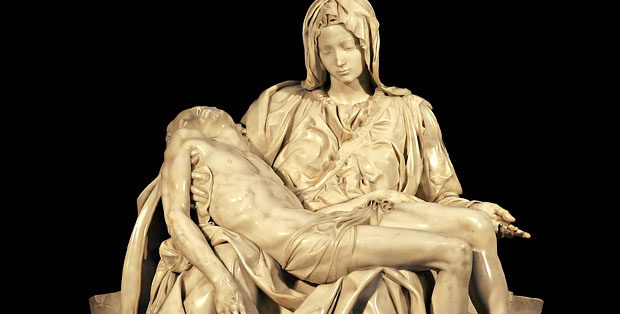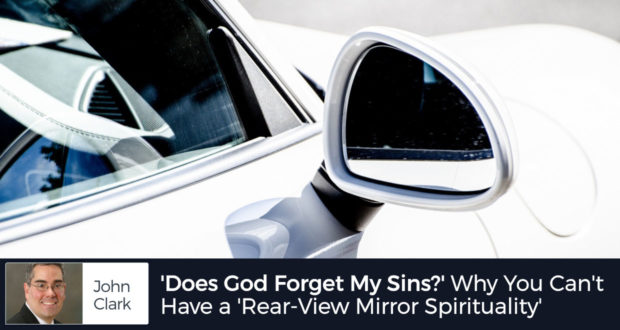When people are learning to drive, they are taught that they should look in the rear-view mirror every few seconds to see what is behind them. That’s excellent advice for driving, but crummy advice for the spiritual life.
As we grow older and ponder our mortality, some of us faithful Catholics are increasingly troubled with anxieties about the confessed and absolved sins of our past. We need to move along; trouble is, many of us have a problem doing that. If you are tempted to look back, let me offer a few thoughts.
If you have an urge to look back on particular confessed sins, you need to recognize that this is often not an act of piety, but a fruitless temptation. The tortured logic of Hell tempts you to be terror-stricken for the confessed sins of yesteryear, to treat them as inescapable realities.
Are they?
Does God Forget My Sins?
Consider Psalm 103:23, which tells us: “as far as the east is from the west, so far has he removed our transgressions from us.” Or Isaiah 43:25, which reads: “I, even I, am he who blots out your transgressions, for my own sake, and remembers your sins no more.”
Or Hebrews 10:17 reads: “Their sins and lawless acts I will remember no more.”
I recently saw a caption that read: “Why do you want to remember what God has forgotten?” Good question. There is a motto I have adopted for coaching and parenting children: Remember your mistakes long enough to learn from them, and then forget them.
Let’s adapt this to the spiritual life: Remember your sins long enough to confess them, and then forget them.
When you are tempted to look back on your confessed sins and have a how-did-I-ever-do-that? moment, it’s important for you to remember something that wise priests have reminded me. In a sense, you didn’t do it. I’m not suggesting that you live in denial, but I am pointing out that the person of yesterday—in a radical and radically-true sense—is not you any longer.
Sure, that person shares some similarities, but that’s not you any longer. And it’s wrong to say that it is you. Each one of us: saints, sinners, and someone’s-in-between, is the person we are today, not yesterday.
As Colossians 3:10 explains, we have not simply made minor adjustments; we have “put on the new man.” And to some degree, we put on a new man with every Confession. That’s the man who matters.
Think of it this way. One of the most beloved sculptures in Christendom is Michelangelo’s Pieta. I’ve never seen it in person, but a friend once gave me a likeness that hangs in my living room.

Michelangelo’s ‘Pieta’ CC Stanislav Traykov Wiki Commons
Over the years, I’ve spent many, many hours staring at it, as it has evoked compassion, empathy, and a determination to love God more fully. If I ever get the chance to see Michelangelo’s actual sculpture up close in Vatican City, I would have a hard time ever pulling myself away from it.
I would guess that in Vatican City, the Pieta’s visitors comment about the striking beauty of Mary, the detail in the wounds of Jesus, and the transcendental glow that it undoubtedly radiates.
When they look at it, does anyone see the shapeless chunk of marble that this statue once was? Of course not. They see the majestic Pieta.
My friend, I want you consider something: YOU are the pieta of God.
We are told that the Pieta was the only sculpture that Michelangelo ever signed. Yet you are far more precious than any sculpture, and you are the only one of you that God ever signed.
Breathtaking though it may be, a statue can only be a representation of God’s love; your life is a manifestation of God’s love and mercy. You are the signature of God.
Instead of looking back on past sins, think about that. And ponder the words you heard when you were absolved of your sins. Here they are:
God, the Father of mercies, through the death and resurrection of his Son has reconciled the world to himself and sent the Holy Spirit among us for the forgiveness of sins; through the ministry of the Church may God give you pardon and peace, and I absolve you from your sins in the name of the Father, and of the Son, and of the Holy Spirit.
May God grant us all the grace of pardon and peace.

 Seton Magazine Catholic Homeschool Articles, Advice & Resources
Seton Magazine Catholic Homeschool Articles, Advice & Resources
